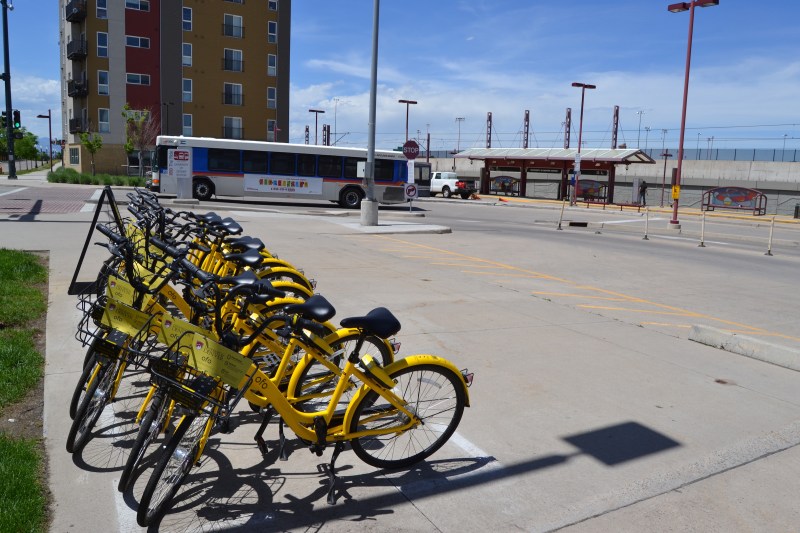Get Ready for Citywide Dockless Bike-Share (and the Return of Scooters)
Scooter companies barged in uninvited and immediately gained a following, leading the city to quickly develop a permit system for fleets of bikes and scooters.

While “scooter wars” have dominated the headlines, a consequential bit of news went overlooked: As of Friday, dockless bike-share is legal citywide. So are scooter fleets, sort of.
Locals and visitors can expect both of these free-floating transport options on the street within two to three weeks, according to Denver Public Works.
DPW created the new type of permit [PDF] after scooter companies Lime and Bird set up shop last month. The companies were uninvited — and their products sometimes blocked sidewalks — but the nimble, zippy scooters immediately gained a following. Besides, Mayor Michael Hancock says he wants more people to get around car-free. So the streets department has cleared a path for the scooter companies to return.
Dockless bike-share companies like Ofo and Lime will also be eligible to apply through the same permitting process, and a rep from Ofo said they would. Here’s a look at the rules Denver has set up for these companies to operate on public streets.
Fleet caps
Each bike-share company is allowed to deploy a combined fleet of 400 bikes (conventional or electric) at first. Each scooter company is limited to fleets of 250. For comparison, Denver B-cycle has 737 bikes.
DPW can adjust those caps at any time during what it’s calling a one-year “pilot.”
In case you’re wondering, the city does not regulate the number of Car2go vehicles allowed on city streets.
Incentives for equitable distribution
Dockless bike-share and scooter-share companies can add another 100 vehicles to their fleets if they ensure that at least 100 remain available in low-income neighborhoods that lack good transportation options (here’s the DPW map). The companies would have to re-balance their fleets continuously to ensure 100 bikes are available in these “opportunity” neighborhoods at any given time.
Before receiving a permit, DPW will also require companies to outline how people without smartphones, credit cards, or bank accounts can use the bikes and scooters.
Current scooter regulations are outdated
Unlike bikes, Denver’s rules for electric scooters aren’t well-developed. They’re considered “toy vehicles” under the law, meaning people can’t ride them in streets or bike lanes and in fact have to ride them on sidewalks. That’s a problem, because they go 15 mph, which poses a danger to other people on the sidewalk.
Nancy Kuhn, a spokesperson for DPW, would not say whether the agency will recommend policy changes to the Denver City Council.
“This pilot program is a temporary way to explore how these vehicles interact with other modes in the right of way,” she said. While they’re only technically allowed on sidewalks, scooter riders must yield to pedestrians under the law. DPW is “coordinating” with the Denver Police Department to enforce that rule, Kuhn said.
Sharing data
The companies will have to share some trip data with DPW, specifically the trips per vehicle per day, and the origin and destination of each trip.
Companies will also have to survey their customers every three months and share the data with the city so staff can better understand who is using the dockless services and what they’re using them for — valuable information that can inform the city’s larger transportation plans.
Paying to play
Bike companies will pay $15,000 for a permit if their applications are approved, plus $20 per vehicle. Scooter companies will pay the same annual permit fee, but will be charged $30 per vehicle.
That money will help the city repair property damage, enforce parking rules, and conduct data analysis.
Parking matters
Speaking of parking, the companies will have to paint designated parking zones across the city — one zone per 10 vehicles — outside the path of people walking and using wheelchairs.
Customers will have to park either in one of the designated zones or within 25 feet of a bus stop or rail station, according to the rules, which DPW says are designed to “enhance transit.” Customers will have to park the vehicles in a way that leaves five feet of sidewalk clearance for pedestrians and wheelchair users — but there’s nothing in the regulations spelling out how this rule will be enforced.
So much for that other dockless bike-share pilot
Dockless bike-share already exists on city streets on a limited basis through a 200-vehicle University of Denver pilot, which has been pretty successful. It’s sanctioned by DPW, but only open to people with DU email addresses.
That test was going to shape the city’s dockless bike-share policy, which was due out sometime next year. Not anymore — the companies have accelerated that process.


